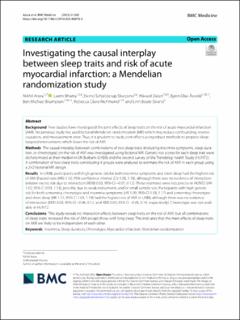Investigating the causal interplay between sleep traits and risk of acute myocardial infarction: a Mendelian randomization study
Arora, Nikhil; Bhatta, Laxmi; Skarpsno, Eivind Schjelderup; Dalen, Håvard; Åsvold, Bjørn Olav; Brumpton, Ben Michael; Richmond, Rebecca C.; Strand, Linn Beate
Peer reviewed, Journal article
Published version
Permanent lenke
https://hdl.handle.net/11250/3113841Utgivelsesdato
2023Metadata
Vis full innførselSamlinger
Originalversjon
10.1186/s12916-023-03078-0Sammendrag
Background
Few studies have investigated the joint effects of sleep traits on the risk of acute myocardial infarction (AMI). No previous study has used factorial Mendelian randomization (MR) which may reduce confounding, reverse causation, and measurement error. Thus, it is prudent to study joint effects using robust methods to propose sleep-targeted interventions which lower the risk of AMI.
Methods
The causal interplay between combinations of two sleep traits (including insomnia symptoms, sleep duration, or chronotype) on the risk of AMI was investigated using factorial MR. Genetic risk scores for each sleep trait were dichotomized at their median in UK Biobank (UKBB) and the second survey of the Trøndelag Health Study (HUNT2). A combination of two sleep traits constituting 4 groups were analyzed to estimate the risk of AMI in each group using a 2×2 factorial MR design.
Results
In UKBB, participants with high genetic risk for both insomnia symptoms and short sleep had the highest risk of AMI (hazard ratio (HR) 1.10; 95% confidence interval (CI) 1.03, 1.18), although there was no evidence of interaction (relative excess risk due to interaction (RERI) 0.03; 95% CI −0.07, 0.12). These estimates were less precise in HUNT2 (HR 1.02; 95% CI 0.93, 1.13), possibly due to weak instruments and/or small sample size. Participants with high genetic risk for both a morning chronotype and insomnia symptoms (HR 1.09; 95% CI 1.03, 1.17) and a morning chronotype and short sleep (HR 1.11; 95% CI 1.04, 1.19) had the highest risk of AMI in UKBB, although there was no evidence of interaction (RERI 0.03; 95% CI −0.06, 0.12; and RERI 0.05; 95% CI –0.05, 0.14, respectively). Chronotype was not available in HUNT2.
Conclusions
This study reveals no interaction effects between sleep traits on the risk of AMI, but all combinations of sleep traits increased the risk of AMI except those with long sleep. This indicates that the main effects of sleep traits on AMI are likely to be independent of each other.

